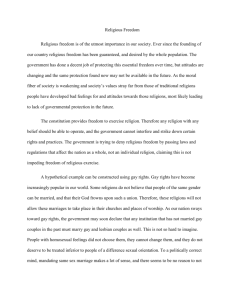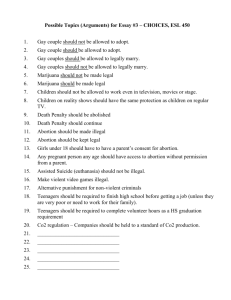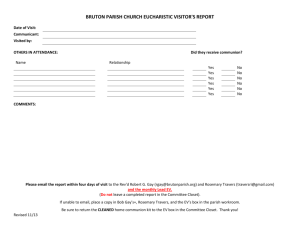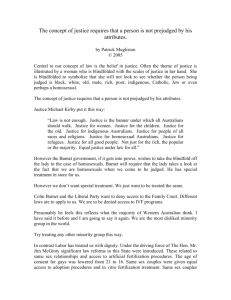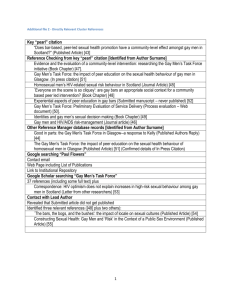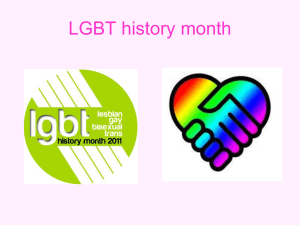Johnson Q&A
advertisement
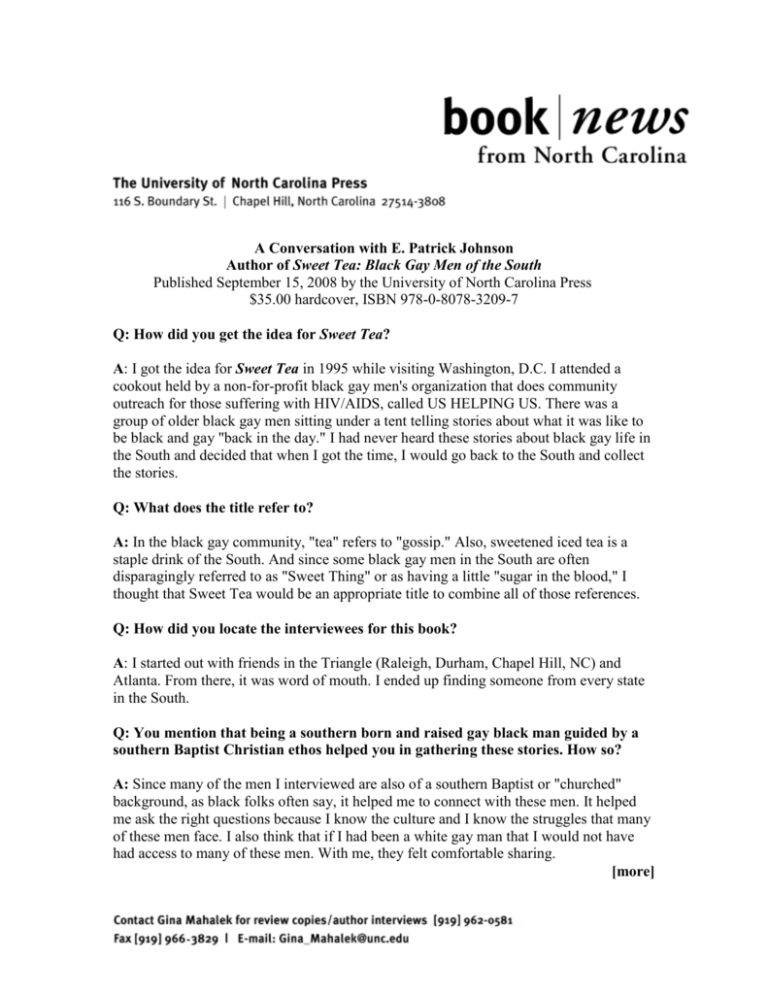
A Conversation with E. Patrick Johnson Author of Sweet Tea: Black Gay Men of the South Published September 15, 2008 by the University of North Carolina Press $35.00 hardcover, ISBN 978-0-8078-3209-7 Q: How did you get the idea for Sweet Tea? A: I got the idea for Sweet Tea in 1995 while visiting Washington, D.C. I attended a cookout held by a non-for-profit black gay men's organization that does community outreach for those suffering with HIV/AIDS, called US HELPING US. There was a group of older black gay men sitting under a tent telling stories about what it was like to be black and gay "back in the day." I had never heard these stories about black gay life in the South and decided that when I got the time, I would go back to the South and collect the stories. Q: What does the title refer to? A: In the black gay community, "tea" refers to "gossip." Also, sweetened iced tea is a staple drink of the South. And since some black gay men in the South are often disparagingly referred to as "Sweet Thing" or as having a little "sugar in the blood," I thought that Sweet Tea would be an appropriate title to combine all of those references. Q: How did you locate the interviewees for this book? A: I started out with friends in the Triangle (Raleigh, Durham, Chapel Hill, NC) and Atlanta. From there, it was word of mouth. I ended up finding someone from every state in the South. Q: You mention that being a southern born and raised gay black man guided by a southern Baptist Christian ethos helped you in gathering these stories. How so? A: Since many of the men I interviewed are also of a southern Baptist or "churched" background, as black folks often say, it helped me to connect with these men. It helped me ask the right questions because I know the culture and I know the struggles that many of these men face. I also think that if I had been a white gay man that I would not have had access to many of these men. With me, they felt comfortable sharing. [more] 2-2-2 A Conversation with E. Patrick Johnson Q: How wide a variety of informants did you have? What age ranges and which southern states are represented? A: The informant age range was 19 to 93 at the time of the interviews, which began in 2004. Every southern state is represented, including Oklahoma and Missouri, which were slave-holding states at one point. Q: Your hometown of Hickory, NC has named an "E. Patrick Johnson Day" in your honor. What's the story behind this? A: I'm the first African American born and raised in Hickory to receive a PhD. Because of this accomplishment, the black community decided that it wanted to celebrate that and convinced the city council to honor me with my own day. So, on July 20, 1996, I was honored with my own day in my hometown. It was quite a moving occasion. Q: Why do you think black gay men have chosen to remain in the South rather than joining the great migrations to urban areas in the North, Midwest, and West? A: Despite what some think about the South, it is a place that welcomes black gay men. Although many have moved to urban areas in the North, Midwest, and West, many stay in the South to be close to their families, to have a slower pace of life, and to live more comfortably because of the lower cost of living. Finally, there are urban areas in the South that have thriving gay communities, such as Atlanta, Houston, Jacksonville, FL, and Washington, D.C. Q: What do you think gave rise to the myth that it's more difficult to be a black gay man in the South? A: I think most people think that sexual expression of any variety is difficult in the South because it is known as such a repressive space because of religion. Thus, it follows that people would think that homosexuality would be even more taboo. But, just like most things in the South that are considered taboo, homosexuality flourishes. Ironically, one of the places that black gay men have found community is in the black church. Q: You've chosen to tell this story through oral histories. Why? A: Unlike my colleagues in literary studies, I like doing research on living people! Seriously, I'm invested not only in the content of the story, but also how the story is told. In other words, I look at oral histories as performance. For me, it means something if someone pauses or hesitates when telling a particular story, or if they take delight in it. I also wanted to have a "living archive" of these men's stories—to have them share their stories in their own words. [more] 3-3-3 A Conversation with E. Patrick Johnson Q: What do you hope to accomplish with the publication of Sweet Tea? A: First and foremost, I hope these men's lives are affirmed. Every one of us has a story to tell, but we often we don't get to tell it. Why? Because no one has bothered to ask. Hopefully, because I bothered to ask, these men will feel some sense of affirmation. Also, I hope that these stories will help other gay men—of all colors and regions—who might be struggling with their sexuality—to let them know that they are not alone. Finally, I hope that the book will debunk some myths about what it might mean to be black and gay in the South. Q: Why have black gay men's stories been so "hidden in plain sight"? A: Everything taboo in the South is hidden in plain sight! The southern way is to be passive-aggressive about everything and not be direct. So, although everybody knows that the proverbial choir director is gay, no one talks about it. I hope that Sweet Tea will help begin the conversation in more direct ways. Q: Why did you choose not to include the voices of black lesbians of the south? A: Initially, I was going to interview black lesbians and black gay men. When I began the interviewing, however, I realized that it was going to be too much to do both groups. I also felt that I did not have the same access to black lesbians that I have to black gay men because of gender differences and my lack of access to friendship networks in black lesbian communities. I haven't ruled out doing a part II that would include black lesbians. It might be called Sweeter Tea! Q: Tell me about your performance piece, "Pouring Tea," and its relationship to this book? How does one complement the other? A: "Pouring Tea" gives audiences a chance to be exposed to a few representative men from the book. Some people who see the performance may or may not buy the book and vice versa, so I think having two forms in which to share the stories is important. In the performance I don't fully embody the narrators whose stories I share, but rather focus on their voices, which I try to affect as closely as possible. Before I perform each narrative, I play a clip of the original interview so that the audience can hear the narrator speak in his own voice. I also include the questions that I asked each narrator in the performance so that the audience does not fully suspend disbelief. I use these performance techniques because I don't want the focus to be on me and on a performance, but on the stories. So far, audiences have been very receptive to the performance and it has made them more interested in "hearing" the rest of the stories in the book. [more] 4-4-4 A Conversation with E. Patrick Johnson PUBLISHING DETAILS ISBN 978-0-8078-3209-7, $35.00 hardcover 576 pp., 20 illus., notes, bibl., index http://uncpress.unc.edu/books/T-8205.html Publication date: September 15, 2008 The University of North Carolina Press, www.uncpress.unc.edu 116 South Boundary Street, Chapel Hill, NC 27514-3808 919-966-3561 (office) 1-800-848-6224 (orders) 919-966-3829 (fax) CONTACTS Publicity: Gina Mahalek, 919-962-0581; gina_mahalek@unc.edu Sales: Michael Donatelli, 919-962-0475; michael_donatelli@unc.edu Rights: Vicky Wells, 919-962-0369; vicky_wells@unc.edu

